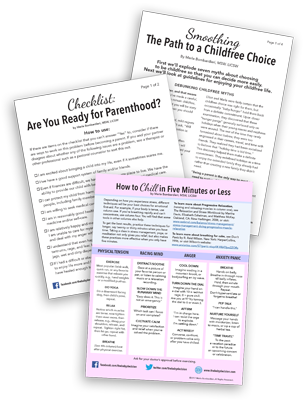
Choosing to become a parent — be it a new mother or father — is a permanent, often difficult decision. Here’s how Krystin and her husband decided on the “not trying, not preventing” route to becoming parents. This made it possible for her to move forward with less terror. — Merle
Choosing to become a mother
by Krystin Morgan
:
Decisions have never come easily to me. As a child, I got lost in anxiety over what toy or book to buy with my allowance or what I should order at a restaurant. Those minor decisions gave way to larger crises, but I eventually realized most decisions could be undone. Even life-changing choices like marriage, homebuying, or a new job can be undone with a divorce, a sale, or a resignation.
You can’t, however, un-have a child.
That’s what filled my brain when trying to make the baby decision. I just wasn’t sure either way.
I’d become more comfortable with big decisions, and throughout 2020 – amidst a worldwide pandemic – I’d replaced my 21-year-old car, left my job of nine years, and temporarily relocated for my husband’s clinical rotations. There were a lot of tears and terror, but I felt proud of myself for handling so many changes at once.
And yet, sometimes I woke up with my heart pounding, nauseated and paralyzed in my indecision. I felt trapped, like no decision was acceptable and I could neither move forward nor backward. Was I only considering parenthood because my husband wanted to? Why did no one else struggle with this?
I know now that I wasn’t alone. Neither are you. That’s why I want to share what helped me make this decision on choosing to become a mother.
What was I so afraid of?
Much of my concern was due to societal expectations and commentary around parenthood. Anywhere I looked – Facebook, Instagram, television – I saw mothers dismayed over parenting.
You’ve probably seen it: moms are always tired, they never get a break, they can’t sleep or shower. Not enticing. I didn’t want to bring a child into the world only to drown my regret in daily bottles of wine.
The alternative – total freedom and what seemed like a lack of being “tied down” – didn’t feel right, either. Wouldn’t I miss out on getting to know and love this amazing new person?
If I had a child, would I still feel like me or would I totally lose myself? Could I still have friendships and creative pursuits and time for trashy reality TV?
Would I even be good at it? I knew my husband would be a great dad (he could instantly relate to friends’ kids and always had fun playing with them), but I only felt maternal toward my perfect, easygoing, elderly dog. Could I handle a colicky newborn or a rambunctious toddler?
What did I actually want?
Once I understood my fears, I had to think about what mattered to me. I created a pro/con list. As I was fully ensconced in the “parenting is terrible” industrial complex, the “pro” list was quite small. The “con” list included reasonable concerns like finances and difficult kid stages, but was mostly full of my fears. While the cons tripled the pros, I knew most of them were fear-based and maybe not reality.
I tried a different tack, writing “I would be happy to be a mom if…” and listing everything that came to mind. I ended up with multiple pages of things like “…if I could still sleep in sometimes,” and “…if I can still read books.” I wrote that I still wanted to travel, to spend time with my husband and friends.
Putting it on paper made it more concrete, and being aware of what I needed let me start brainstorming how to achieve it.
It also helped me realize that nothing in my life was truly incongruous with parenting. Although it may not be easy, I probably could have all the things I wanted. Plus, I realized that if I could still live the life I wanted, I would like to be a parent. While I couldn’t guarantee any of the things I wrote down, I had a starting point to think about how I could at least try.
I also thought about all the things I’d feared and done anyway: getting a dog, taking a new job, buying a house. They all ended up worth it in the end.
Making a plan
My husband and I are fortunate that our families both live within an hour’s drive. We knew everyone would be overjoyed at a new family member and willing to help out.
I also realized most of my friends already had at least one child, and those who were childfree really enjoyed children. That meant I’d still have a social life even if I had a baby in tow.
The most important thing was ensuring my husband and I had an equal partnership. One of the biggest gripes people have about parenting is a lack of help from their partner, and I didn’t want that to be our story. We talked about what such a partnership would look like and where we could each give and take.
I realized that I liked thinking about what I call the “strategic” aspect of parenting: helping a child learn and grow, navigate emotions, and solve problems. I was less excited about the “tactical” parts: making lunch and dinner, daycare drop-off. My husband felt like that part was no big deal, so it seemed like we were already starting on the right foot.
(In reality, we have, of course, both ended up with an equal amount of each, although my husband definitely makes more breakfasts and I’m the one who reads all the parenting books!)
What are other people doing?
Now I knew what I didn’t want, what was important to me, and how we might do it. But was it even possible?
I paid close attention to the people in my life. Many of my friends had already either had kids already or decided to be childfree. I looked at what their lives looked like: could they do the things I wanted to do?
One day I texted a handful of friends to ask what they really thought about parenting. I knew they would be honest. Each of them said some days were hard, but it was worth it and their days were full of love.
A few acknowledged there’s no great way to “sell” parenting: what lights you up as a parent seems banal to anyone else. (I can now confirm this. I never thought something as small as my child saying a new word would make my entire week.) And they shared that they believed if I chose to have a child, I’d be a great mom.
From these conversations, I took away that life might be different, but I could still do things that were important to me. Having a child could be like expanding my world and adding to it, rather than losing something.
Budgeting & jumping in
There was also the financial aspect of parenting; we both planned to continue working, so childcare would be an expense.
At the same time, friends had already offered all of the infant accoutrements to have or borrow. We wouldn’t need to spend money on much, gear-wise. We had great health insurance so we weren’t worried about the cost of prenatal care or birth.
For us, this was more of an afterthought; we knew if we decided we wanted a kid, we’d figure out childcare. It wasn’t a reason for us to stay childfree.
I felt like there was something I would miss if I didn’t experience parenthood. I wanted to see how my heart would expand and what sort of bond I’d build with this brand new little person. The more I thought about it, the more I realized that my reasons not to be a parent were almost entirely based in fear.
Avoiding something just because I was scared wasn’t a good enough reason.
But I have to admit, after all of that, my decision was more of a non-decision. I had to let myself at least imagine that I was leaving it up to chance or fate or the universe, so instead of charting fertility and tracking ovulation, we joined the ranks of all those “not trying, not preventing.”
It was a leap of faith, but I felt that whatever was meant to happen would happen.
Mom life
This article is meant to share my decision-making process on choosing to become a mother — not to sell anyone on having a baby.
However, it’s hard for me to talk about my daughter without feeling like I’m jumping into a sales pitch; she’s just that great. She’s now a year and a half old and I look forward to seeing her every morning. Seeing the world through her eyes and watching her light up when she discovers something new is the highlight of my life. She gives the best hugs in the entire world.
None of my fears came true, by the way, at least not in any major way. I may have less time for things like sitting around, but it’s because my daughter and I are busy with all of our friends. I may be slightly more tired, a little bit busier, and somewhat financially poorer, but I am so, so much richer in so many ways.
— Krystin
What has worked for you?
.
Are there any strategies that have worked for you for talking about not having children or avoiding / managing such conversations? Tell me what’s worked or not worked for you in the comments below, or in our Facebook group called “The Decision Café” — or on my growing Instagram page!
You can find more helpful posts from me and other contributors online here and in my bi-monthly email newsletter. If you aren’t subscribed yet, please stay in touch and quickly sign up here or the pop-up box below.
You can contact me on social media, or use the comments section here, or send an email using my online contact form.
Photo on this page by Yoann Boyer on Unsplash.com

